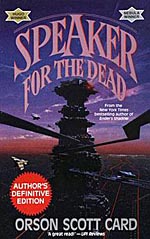
![]() verkisto
verkisto
7/26/2016
![]()
Card has gotten a reputation over the past dozen years or so for being a conservative-minded person, going so far as to judge large groups of people for their beliefs. Reading Speaker of the Dead makes me wonder what happened to Card since the publication of that book to make him so jaded. The whole point of the book (which, he says in the foreword, was the novel he really wanted to write when he published Ender's Game, so it makes me feel like this was his Real First Great Book) is one of recognizing the differences between one group of people and another as being something to accept and understand, not something to fear.
The book features Ender, now going by Andrew, three thousand years in the future of the universe, but only about 25 years into his own. He now speaks for the dead, as he did for the Buggers after the war, and his journeys take him to a settlement on the edge of the universe called Lusitania, where he has been called to speak for a handful of dead, all centered on one particular family. While there, he comes to know of the piggies, a native species to Lusitania, and the entire novel is about him coming to understand that species and teach the rest of the planet that they are people, too, just with their own belief systems.
With me, it's hard to divide the author from his work, so it was shocking to me to read a story that was all about acceptance over judgment, paired with what Card has said so publicly about his own conservative beliefs. The two themes aren't compatible to me, and it makes me think that either Card once believed in the themes he used in this novel, or that when he wrote this book, he was striving for greater fiction than his readers realized. Either way, though, I was surprised to find a novel I could accept so readily.
The novel isn't without its faults -- the secondary characters are mostly shells with traits that make them distinctive, instead of being full characters, and it feels very disjointed for the amount of ground it covers -- but it's well told, and emotionally gripping. Card seems to write in a condescending tone at times, even outside of how his characters talk, but the story still flew by. In fact, it was nice to read a book where I was wanting to finish it for the sake of the story, instead of wanting to finish it so I could move on to the next book on my list.
I really enjoyed this book, much more than I did Ender's Game. They're two very different novels, but still require reading them together to get the full story of Ender and the effect of the war on him. It's safe to say that if you liked the first book, then you should make an effort to read the second one, too.